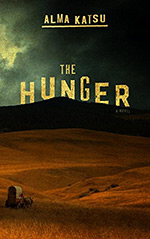
![]() SpaceAndSorcery
SpaceAndSorcery
2/8/2019
![]()
While the fateful journey of the Donner Party is a matter of record for American history, it's not as well known outside of the U.S.A. so I was not familiar with this event apart from having heard it mentioned once or twice in passing, and as soon as I encountered the first reviews for Alma Katsu's book I went in search of more information about it: what I found was a tale of hardship and horror whose reality seemed to surpass any fictional tale of the supernatural I might have read until now.
The Donner Party was a group of hopeful pioneers headed to California to start a new life in what was the new frontier for the times, the middle of the 19th Century: they set out from Missouri in the late spring of 1846, but instead of following the tried and tested trail other adventurers had successfully traveled on, they decided to attempt the newest Hastings Cutoff, named after the explorer who had first opened it.
Unfortunately, Hastings had not specified either that the cutoff would add a considerable number of miles to the trek, or that the way was more suited to men on horseback rather than oxen-driven wagons loaded with supplies, so that a series of accidents and drawbacks cost the travelers precious time - not to mention the loss of several animals and even wagons - and at the start of a particularly hard winter they were stranded and snowbound on the Sierra Nevada, as their supplies ran out and they found themselves with little shelter and no food. The survivors who were rescued by a search party in the early spring of 1847 had had to resort to eating the flesh of their dead to keep alive.
The historical events of the Donner Party look horrific enough in their stark reality, and yet the author decided to insert a supernatural twist to the story, in the form of a disturbing presence stalking the wagons from the very start and at times grabbing some hapless victim whose remains hinted at something inhuman and terrifying at play. While this choice added a further (and maybe unnecessary) layer of dread to an already ghastly situation, it worked as a sort of mirror for the overall darkness that progressively fell on the colonists, one that seemed to come from them rather than from the outside, a force that was freed once the people were removed from the moral and spiritual boundaries of civilization.
From the very start we see how the relationships among the 90-odd people of the caravan are subject to strain, mostly due to the different social backgrounds and mindset of the various individuals, so that they fall prey to arguments that end up dividing the group into smaller factions, at odds with each other. Once the true adversities start piling up on them, these divergences flare up, sometimes with dramatic consequences. George Donner's wife Tamsen, for example, is a practitioner of natural medicine though her knowledge of herbs and remedies, and therefore the subject of mistrust that quickly turns into the belief she might be a witch, with the consequence that the Donners are shunned and treated like pariahs. Or once the supplies start dwindling, those with more refuse to share with the less fortunate, all too easily forgetting the principles of Christian charity that everybody seemed to profess.
As the journey becomes more harrowing and takes its toll on people, animals and supplies - the crossing of the salt desert being one of the most heartbreaking segments - whatever shred of humanity the group might have held on to seems to disappear, each wagon, each individual becoming a world unto itself, focused on its own survival to the exclusion of anything, and anyone, else. And once that humanity dwindles or is silenced forever, once any residue of acceptable social behavior evaporates under the hardships, it looks far too easy for the pioneers to let go of their more enlightened habits and to fall back to more primitive patterns. First they stop caring about appearances:
They were all starting to neglect themselves, losing the will to keep themselves clean and tidy. To remain civilized. Day by day they grew wilder, filthier, more animal.
Then there is a scene in which the starved group is forced to kill one head of cattle to have some food, and the people partaking of that flesh look more like a bunch of cavemen rather than city born and bred individuals:
...no laughter or songs or shared bottles of whiskey [...] Now it was just the sound of ravenous eating, the smack of lips and teeth tearing flesh off bone.
With this particular sentence I was strongly reminded of Tolkien's description of Gollum, about his "furtive eating and resentful remembering", and it was a chilly comparison, one that emphasized the regression of these pioneers to a more primeval state, one that was much more horrifying than the shadowy beings haunting the group from the encroaching darkness. And for this very reason, once the supernatural element in the story is revealed, it looks almost mundane, far less frightening than the mindless savagery consuming the group of settlers.
The Hunger is not an easy book, and certainly not an uplifting read, but despite its bleakness I could not tear myself from it: the author has a way of relaying even the most horrific of details with a blunt clarity that never slips into morbid gratification, and for this reason offers a compelling tale of the heights and pitfalls of the human soul when subjected to intolerable stress. Like the colonists' own, this was not an easy journey, but it taught me a great deal about humanity, and I would not have missed it for the world.
http://spaceandsorcery.wordpress.com